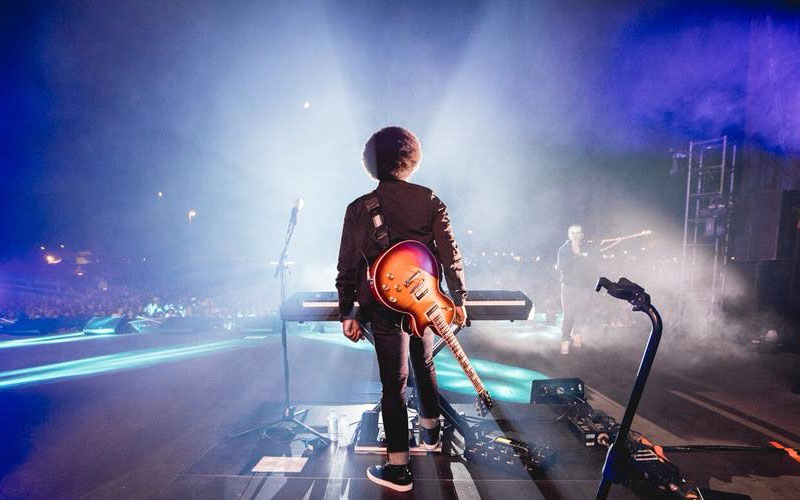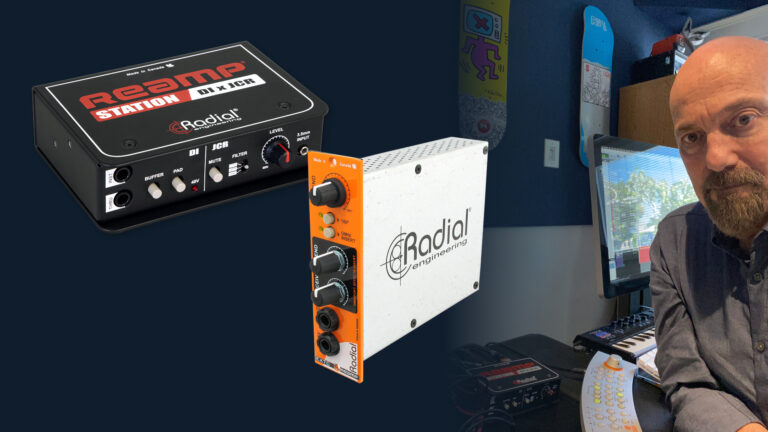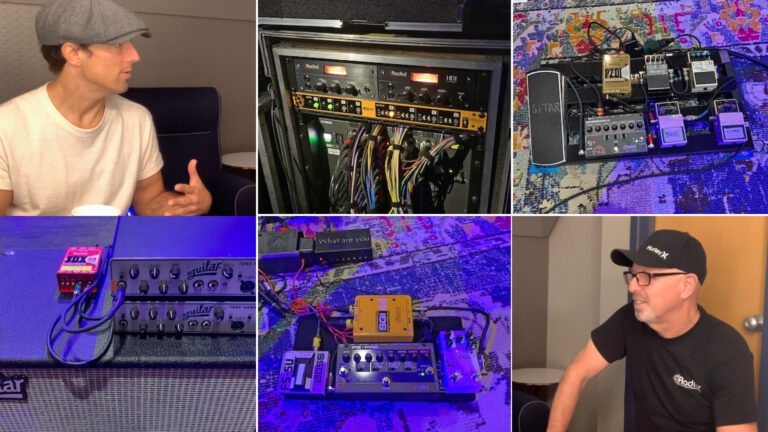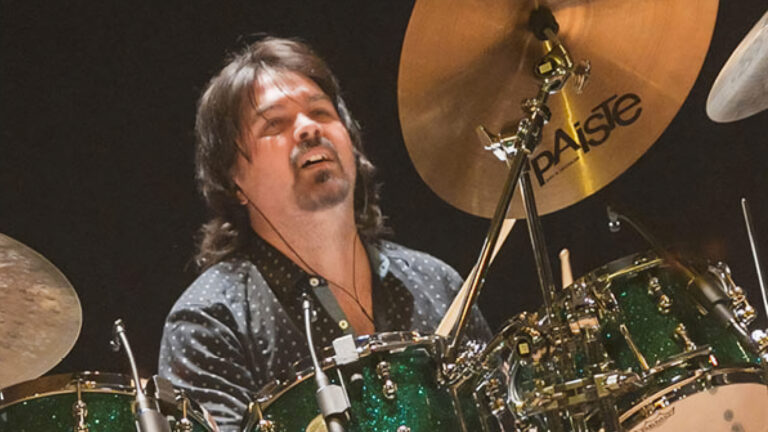Will Wells wears many hats — producer, songwriter, professional musician, recording engineer, to name a few. We recently had a chance to sit down with Will on a break in his busy schedule to talk about projects past, present, and future, and what role Radial Engineering products play in those projects.
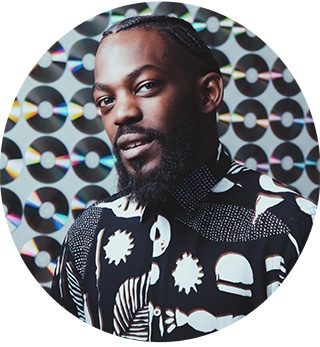
Radial: You’ve worked with a wide range of high-profile artists, including Quincy Jones and Barbara Streisand, Imagine Dragons, Logic, Wyclef Jean, DJ Premier, LMFAO, and Pentatonix, just to name a few. Talk about the process of getting involved with these artists and projects and how they typically start and evolve.
Will: My involvement with all of these artists takes on a different shape depending on what the project is and what I’m called into the studio for. For example, with Quincy Jones, I was working with his management company music directing an artist of his called Nikki Yanofsky. So that involved dealing with his company and Adam Fell who is the president of Quincy Jones Productions.
Radial: You worked on several projects with Quincy, correct?
Will: Yes, we did do a special with Quincy at Capital Records back in 2013, which is one of my most memorable sessions ever. I always say, if there’s a way that you’re going to meet Quincy Jones, this is the way to do it. I was a music director on the session where he was the producer, and it was for a Canadian television company, CBC.
Radial: So each project you work on tends to have a different structure?
Will: Yes, for the Canadian project with Quincy, I was a music director under his umbrella, but say with Imagine Dragons, for example, I was a touring member.

Find out how Will uses the Radial SW8-USB Interface and Audio Switcher.
Radial: How did the Imagine Dragons gig come about?
Will: That came by way of my alma mater Berklee College of Music. They were looking for a new touring member and they contacted Berklee for a referral. Berklee churns out so many awesome musicians, so they can take more of a neutral stance on the selection process. And it was one of the most fulfilling experiences of my life at that point, being able to see the world in that way and experience so many different cultures, performing in areas worldwide.
Radial: What about some of the other projects, how did they come about?
Will: For an artist like RZA, for example, and Wu Tang Clan, those referrals came by way of my mentor Richard Gibbs. And he tends to have a way of doing this. Actually, I was talking to a group of students last night about this process, and I told them that you never know how the gig is going to come.
Radial: So how did Richard help you with these gigs?
Will: Richard is a critically acclaimed and accomplished film composer who happens to also own one of the most incredible studios in the world, Woodshed Recording in Malibu. I had studied film scoring and music production and engineering at Berklee, and through that connection, I became his assistant initially, and eventually started managing the studio and working as chief engineer.
Radial: So one thing led to another.
Will: Yes, even after I was the in-house guy at the studio, he would always call me when he had interesting sessions that he thought I should be a part of. And these oftentimes evolved into other opportunities.
Radial: Can you share an example?
Will: Yes, for example, Richard would pull RZA aside and say, “You know you have more than just a second engineer here, he’s a musician, he can sing, he can do other things.” And so I the door was opened for me to participate on more than just a technical level. And it also just so happened that the week before I did that session at the Woodshed, RZA found himself in the market for a new engineer. I like to call it the stars aligning, but that’s how things like that happen more often than not.
• Listen to a featured selection playlist of Will’s songs and compositions on Spotify.
Radial: How about the gig with Logic, how did that come about?
Will: It was very similar. I started with Logic more on the creative side where I was a second engineer at Woodshed on the sessions. Again, Richard Gibbs told him that I did more than just wrap cables and make coffee. And so Logic generously offered me the opportunity to participate on more of a creative level in these sessions.
Radial: So you ended up playing on the tracks as well.
Will: Yes, I ended up playing on songs like “1-800” which I think is four or five times platinum. I ended up working on that entire album, which was a staple in his career at the time because it turned him from an amphitheater touring artist to an arena touring artist. And I went on the tour with him as well.
Radial: So the takeaway is there there’s no formula to success, necessarily.
Will: That’s right! It’s different things. That said, it does seem like my technical prowess was usually the way into a lot of these situations, even with LMFAO.
Radial: Talk more about the LMAFO gig.
Will: Sure, with LMFAO, I started as Sky Blu’s front-of-house engineer and production manager for his personal project which was called Big Bag University. Like in the other situations, that led to a creative collaboration between us. So, again, it usually starts with a technical role, which evolves into exploring more creative opportunities from that.
Radial: Put another way, it sounds like the opportunities come as a mix between networking with people that you meet in the midst of just day-to-day, as well as connections that happen as a result of on-the-job activities.
Will: That’s right. Especially in the beginning. The technical support process happened much more that in the beginning, when I was just getting started, and before I was able to build up some credibility to be able to contribute from a creative standpoint.
Radial: And so your reputation began to evolve into more creative roles.
Will: Yes, eventually, I said engineering is not going to be the main thing on my calling card anymore. I want to be brought in as a writer, as a producer, as an executive producer. And after so many people so graciously gave me a shot, that led to me being able to start going out on my own limb and saying, “Hey, I want to write or I want to produce or I want to executive produce for you.” And those relationships turned into even greater ones when some of these artists got involved with record labels and things like that. The playing field leveled up, which I’m very grateful for.
Radial: So as someone who is a producer, songwriter, professional musician, recording engineer, etc., talk about both the challenges and the benefits that come with wearing multiple hats on a project. Like when you’re called in to perform a role such as engineer, but that role morphs into another role. Talk about how that happens, and how you handle that.
Will: I think the key to existing in a place where you have the ability to do several things is to first understand exactly what you’re called in to do and make sure that you get that job done first and foremost. And if that opens up an opportunity for you to use your other skills, then sure, have those conversations. But make sure that you’re not pushing these additional roles on other people. I see it as being there to add value to the project.
Radial: And just let things evolve organically.
Will: Yes, exactly! So if it means that, for example, in writing sessions, we don’t have to hire an engineer because that is part of my skillset, then I’m happy to do that because then it saves people from having to hire an extra person. It also adds more flow to the sessions and allows the key players on the project to be comfortable knowing that the technical side is covered and we can just get to the creativity without having to navigate another personality in the room as well as any hurdles when it comes to technical details.
Radial: Is there a specific philosophy you approach each project with?
Will: I always like to say, if I’m there, I want to make sure that the artist first and foremost doesn’t have to worry about any technical hold-ups or anything like that. Or even communication with the technician at times when it’s appropriate. Now, there may be other times, for example, if I’m recording a 65-piece orchestra or something like that, I probably shouldn’t be the engineer on that session if I’m conducting the orchestra. And I say that from experience.
Radial: So there are times to play a specific technical role, and times to branch out creatively.
Will: Yes, exactly! There are times when it’s appropriate to wear multiple hats, and then there are times when it’s appropriate to zoom in and really just focus on executing one thing extremely well. So you have to have the wherewithal to understand when you’re doing too much, and when you should really hone in and execute certain aspects of your skillset with a very high degree of integrity and excellence.
Radial: You mentioned earlier that sometimes that you start focusing on just the thing you’re hired for, but that can lead to an expanded role because others have confidence in you based on your comments or your suggestions. Talk a little more about that.
Will: I have a personal rule when this happens. It’s funny, I was speaking to a group of college students last night, and this is something I actually made a point of. If I’m called in to be the engineer, I personally am not going to step outside of the role that I’m called on to be. However, if a mentor or the studio owner or whatever says something to the client that lets them know that my skillset is outside of the particular role I was hired for, or if the client knows and asks me, I’ll have those conversations. But, and this is important, I want to make sure that there’s an invitation there because my number one rule is that if I’m hired to do a particular thing, that’s the thing that they want me to do and I don’t expand beyond that unless they bring it up. And if they don’t know that I do anything else, or don’t ask for whatever reason, I’m okay with that because I’m hired to do the thing that they know that I do, and I think it’s important to fulfill that job, fulfill that position, and not push anything on anybody else.
Radial: But in the case of say, Richard Gibbs, your mentor, that might be different.
Will: Yes, if say, Richard Gibbs tells the RZA that I’m also a musician and a singer and a piano player, whatever, and then he asks me if I’d like to contribute beyond what’s expected of me, then I’m 100% open to that. That’s what happened with Logic and Sky Blu from LMFAO and many other situations.
Radial: Let’s talk about money for a second. Does an evolving role on a project change your compensation for that project, or how do you approach this conversation?
Will: I’m absolutely happy to answer this because it’s a very important question that you’re asking. It’s foundational to my philosophy about why I only do the job that I’m hired to do unless I’m asked otherwise. And when they ask me otherwise, we have that conversation about compensation. Very professionally … it’s never tense or anything like that, but there’s generally an understanding about how this works.
Radial: And it probably comes more easily because, like you said, it’s the client taking the first step to expand your role, correct?
Will: Yes, that’s exactly why I want the client to take the first step in initiating a creative position beyond the technical role that I may be hired for, assuming we’re starting from the technical role point of view. Because, if I start giving suggestions unwarranted or unasked for, I can’t really make an argument that I deserve any creative compensation or intellectual property if they didn’t ask me in the first place, you know what I mean? I want them to take the first step, and then we can have that conversation about compensation.
Radial: Can you give some examples of this?
Will: I’ve been in situations where I’m an engineer at a session where people in the room were offering ideas and opinions when it wasn’t warranted, and it did become quite an uncomfortable situation. And, I’ve been the creative one on a session where perhaps some of the technicians were offering creative advice when it wasn’t actually asked for and it complicated the situation. In these cases, for a lack of better words, you’re being annoying, and I don’t want to be annoying. So I try and learn not only from my mistakes, but from other people’s as well.
Radial: In looking at your website which talks about many of your different projects, it says you met Anthony Ramos when you served as electronic music producer on the Broadway hit Hamilton. That’s a very different role from studio engineer. Talk about your role on Hamilton, and how it morphed into the role as executive producer on Anthony’s debut album, The Good & The Bad, and what specifically you did as executive producer.
Will: Sure. So it’s actually a very interesting story that led to that role with Anthony, and it really started out as my first job out of school, which was working for Alex Lacamoire on Bring It On: The Musical. And Alex Lacamoire is the music supervisor, music director, and orchestrator on Hamilton. And so after working with him on Bring It On in 2011, he asked me to come back to New York with him to continue working on a performance that Lin Manuel Miranda was putting together for Jazz at the Lincoln Center, their American Songbook series in early January.
Radial: How did the role as electronic music producer come about?
Will: It’s interesting because electronic music producer was a term that we had to create together to define my involvement because it hadn’t actually been done on Broadway before in such a capacity. And so I get to the Public Theater January 2015, and I meet this brilliant cast of incredible individuals that were working on Hamilton. And I’ll never forget hearing Anthony sing a song called “The Story of Tonight.”
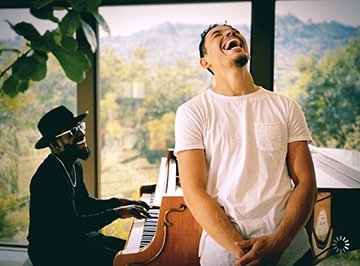
Radial: Did you and Anthony hit it off right away?
Will: It was interesting because he didn’t actually sing that much in the show in terms of solo material, but there was just something about the melody that they gave him, plus his brilliant voice that really made him stand out to me. So fast forward to February 16th, 2015. Opening night off-Broadway at the Public Theater, and I go up to Anthony and I say, “Hey man, obviously everybody in here is extremely talented and brilliant at what they do, but man, you have something special.” And I said, “I would love to collaborate with you in some sort of way.” And so, this is another story, but the day after that was my first day with Imagine Dragons, February 17th, but all throughout that tour, whenever I’d come back to New York, Anthony and I would meet up from time to time and he would play me some of the songs he had been working on, I would show him some of the songs.
Radial: So you and Anthony stayed in touch while you were touring with Imagine Dragons.
Will: Yes, it was a busy and productive time! During that tour, I got my first major cut as a songwriter with a major label for the Pentatonix called “Can’t Sleep Love.” Anthony and I would talk about what it meant to have intellectual property and write songs and have them published. And we started building, not only an incredible brotherhood and friendship, but also a beautiful business relationship and exploring what that looked like together. And so that turned into us collaborating on his music, doing his first show, which we did at the Triad Theater on the Upper West Side. And we really just began exploring this beautiful, creative/business partnership, which eventually resulted in us creating a company together called Whole Team Winnin’ LLC.
Radial: What was the first project for this endeavor?
Will: We put out his first EP called The Freedom EP, which was a collection of songs we had done over time, incorporating themes around the change politically in American and this revolution that was happening in the youth. And eventually, we started writing more and more music after he left the show. And fast forward a year later, January 2019, he gets signed by Republic Records. And so he was positioned to do his first album, and his team and the label thought that it would only make sense to have his creative partner be the executive producer on his first album.
Radial: That must have been an exciting moment to see that come to fruition.
Will: Yes, as I mentioned, we not only built this creative partnership, but he understood that I really have an affinity for business outside of just technical and creative that I do in music. And so that really helped from the label point of view, which addresses what we talked about earlier — what does it mean to have that role as an executive producer. Well, not only does it mean making sure that there’s fluidity throughout the project that he does, but it also means that I make sure that all the musicians that record get paid. I file the union contracts and make sure that I keep track of everybody at the sessions. Additionally, I communicate with the record label and management, get sign-offs on credits, mixes, masters, etc.
Radial: How do you and Anthony interact during writing and recording sessions?
Will: I help him when he has notes for the producer or mixers, because I am a producer myself. I know that there’s a language that they’ll be able to understand and I can help communicate Anthony’s vision and thoughts. Not that he doesn’t understand that language as well, but I want him to be able to just say whatever he wants in terms of notes. If he says, “I think that this should be a little bit darker,” I could say, “Well, maybe we can use a different kind of synth here. Maybe we add a different color with this plug-in or this texture.” We just communicate that in a language that I know will be as easy as possible for whatever collaborators we’re working with to understand. And all that leads to us getting to the common goal, which is to have a great record that everybody loves.
Radial: It sounds like from what you were saying earlier that the chemistry between you and Anthony, or between you and a collaborator, has a lot to do with the success of a project. Not that you would work with somebody necessarily you don’t have chemistry with, but how important is the personal connection, chemistry-wise, between the two personalities in terms of deciding to work on a project or not?
Will: I think it’s paramount. There has to be a chemistry there, that’s the first thing that I think both of us pay attention to. And by both of us, I mean the artist and me, whoever that artist is. And there has to be a certain level of comfort there. So that way we could actually speak freely with one another when it comes to addressing notes or when it comes to just trying to move this thing forward. We have to be able to be honest with one another, and when you’re not comfortable with somebody, I think that there are walls that go up that prevent that honesty that can allow you to get to a point of everybody being comfortable with the final product.
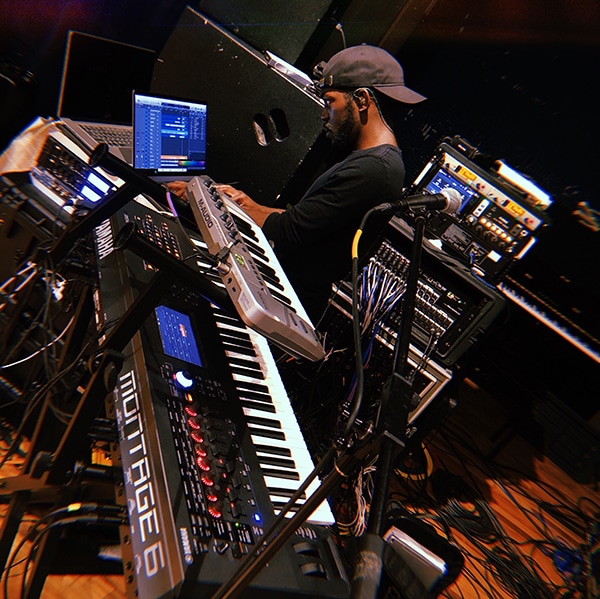
Radial: You’ve been a big fan of Radial gear for a while. Talk about your introduction to Radial, how you found out about the brand and the products, and then a little bit about some of the Radial products that you use and why you like them.
Will: I almost feel like my introduction to Radial gear was the same as my introduction to the studio. For me, Radial gear is a staple in any recording environment, or live music environment to be honest. And so I think that it was a natural progression of me saying, “Okay, well everywhere that I go, I always see and use these Radial products, so it only makes sense that I would explore a partnership with Radial because the gear is already part of my toolkit.” And I always like to say this when I form strategic partnerships with companies like Radial. That is … I say, “I’m buying your stuff whether we have this partnership or not because I actually believe in the product.”
Radial: What particular Radial gear do you use?
Will: It’s funny … I’ve been looking through my gear inventory spreadsheets just because there are so many different things I use for different purposes. But one of the main tools that I use as a music director for playback is the SW8. When I was preparing to tour Anthony’s record, I had been using the Radial SW8 for many years, which is the switcher DI that takes eight channels from two separate sources, and you can switch between them

Radial: How long have you been using the SW8?
Will: I heard about the SW8 even back in my Imagine Dragons days. I mean, literally, almost everybody had this SW8 playback and swore by it. When Radial announced the Radial SW8-USB, I said, “Oh man, this literally makes my life so much easier as a playback engineer for live shows.” So I bought one. And literally, I lie to you not, in less than 5 minutes I had switched out my entire system on a break in rehearsal. It was class-compliant with my system, which means I didn’t have to download a bunch of drivers. It worked immediately. I took the USB cables out of my interfaces and I plugged them into the back of the Radial SW8-USB. I took the XLR cables from the outputs of my old SW8 and I plugged it into the new one, and nobody even knew that I had changed anything. And that’s what I call seamless integration!
Radial: So you use multiple SW8s?
WILL: Yes, I was so excited about the launch of the SW8-USB, I created a backup rig using my old SW8. So nothing goes unused!
Radial: So this setup basically streamlines your workflow?
Will: Yes, I’ll be working on two different computers at the same time and be able to feed them both into the system and switch back and forth seamlessly during rehearsal. And it really makes things a lot easier, and technically, it’s a lot less of a burden than having to have two completely different computers. When you think about how people monitor as well, they just have to worry about one set of playback channels as opposed to two separate sets. So it really makes my life easier more than I can ever explain.
Radial: How does the USB functionality in the SW8 benefit what you do in your workflow?
Will: Well, the SW8 without USB requires interfaces. It requires a tool like the MIDI Solutions Quadra Thru, which I use. That allows me to duplicate the midi sources seamlessly to go to separate interfaces. To get down to brass tacks, as great as the Quadra Thru is, any ancillary devices like this actually results in more potential weight and more potential things that can break when traveling or flying if we have a fly rig. So what the SW8-USB allowed me to do is consolidate everything into one small Pelican carry-on.
Radial: So this brings a greater sense of confidence and ease-of-mind that your rig will work as expected when you get to the gig.
Will: Yes, as opposed to having to check my playback rig and worry about it every time I landed. You know, to see if the half-rack interfaces had broken or moved around too much. The SW8-USB really made my life easier, and ultimately it’ll cost the artist less money because it’s less checked bags. I’ll be able to keep the most important part of the larger sound backbone next to me on the flight. It just made the travel rig a lot smaller, a lot more concise and lighter. And that is actually worth a lot! Say you’re on a tour, on a fly tour, it’ll cost you a lot less money to not have to check an extra bag every time. So a consolidated piece of gear like this has a bigger impact than people may actually realize.
Radial: And so along with the SW8, are there other pieces of Radial gear that you use?
Will: Oh man, the SW8 and SW8-USB is just a piece of it. I use so much Radial gear! On tour for example, when I do key bass or play bass, I use the Radial Bassbone OD Bass Preamp. I’m always looking on the Radial website at the gear. I actually just go to the site just because I think it’s so well designed, and there are so many awesome products that I literally want everything! I saw the new Bluetooth DI and I was like, “I need that!” Every time I go on the website, I’m like, “I need to get off this website because I’m literally going to order everything!”
Radial: How do you use the Bassbone OD?
Will: For the live show with Anthony, we wanted to have one bass signal coming from the bass position on stage that the mixer could see, while giving us a DI output that combined both signals. At the same time, we wanted also allow the house engineer to have essentially a little mixer down there so he can level out different instruments. There’s a lot of different parameters on the Bassbone OD that make it very useful for us to get consistent signals while taking up less of a footprint on my stage plot and input list. So the Bassbone OD has become a staple in the setup for having the consistent and solid sound on stage from the bass position.
Radial: How about other Radial gear that you use?
Will: Obviously, the ProDIs and ProD2s are huge for me. And the splitters as well, including the OX8. The OX8 has transformer splitters where, when it comes to recording signals and also using it for a live performance, I can split the signal several ways while keeping it pure. All in all, if there’s an essential piece of Radial gear I couldn’t do without, it would be the SW8 USB, or the SW8. For playback, that’s an essential. The shows I work on wouldn’t be able to happen without the SW8 or SW8 USB.
Radial: You mentioned earlier about Radial being a staple in the studios. Any thoughts as to why Radial has developed that type of professional reputation and profile?
Will: Well, it’s consistent, it’s durable, and it always holds up as the standard. I feel much more comfortable, whether I’m walking into the studio or walking onto a stage, when I see Radial gear there. I’m like, “Okay, I know what it’s going to sound like. It’s going to be exactly what I’m looking for. And I think that pros in the industry at large feel this way, which, to me, explains why I see Radial products everywhere.
Radial: A common comment we hear from pros and artists alike about Radial is, “Radial is a company that seems to make the products that I never really realized I needed, but once I see it, I’ve got to have one of those.” As you mentioned it earlier, you go on the website and you’re like, “Oh, that’s really something I could use.”
Will: That’s exactly why I can’t spend too much time on the website, because I will order literally everything! You can quote me on this: “Radial is the one company that I have a backup piece of gear for that I never have to use!”
Radial: In closing, what’s on the horizon for you work-wise?
Will: I just finished wrapping the writing sessions Anthony Ramos’ second album. I’m the executive producer, and the album will come out on Republic Records. And I’m sure with the release of the album, we’ll have more live performances. In the process, I’m sure I’ll be figuring out where I can integrate some more Radial products into the fold!

